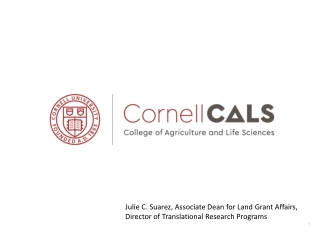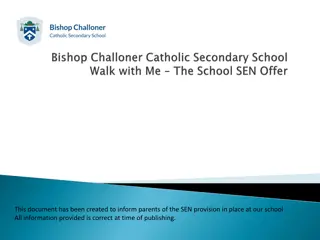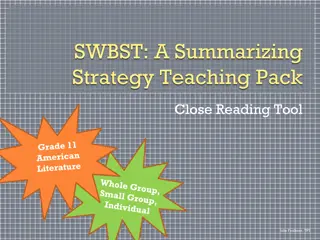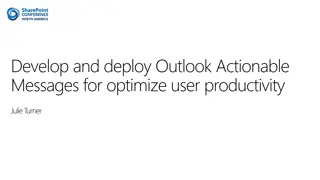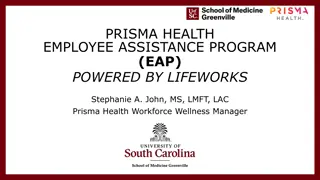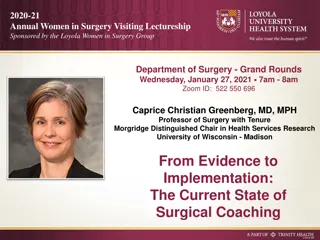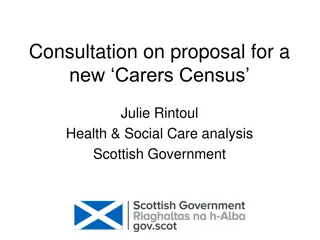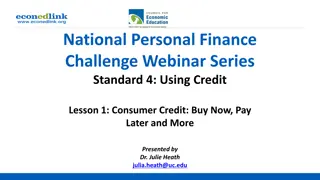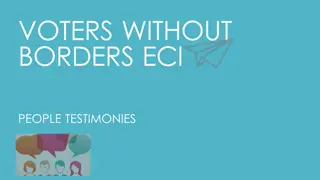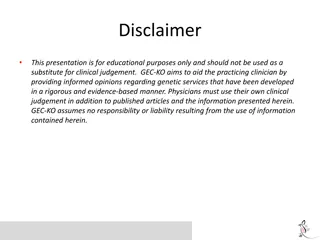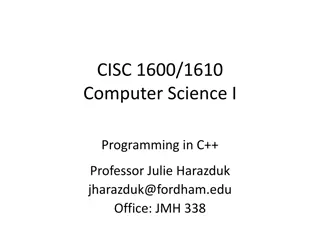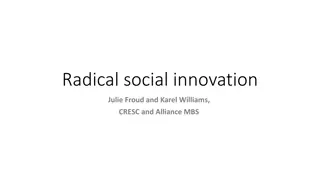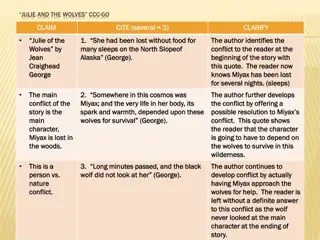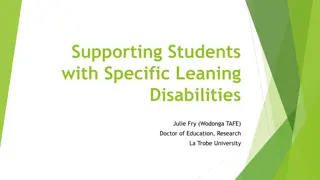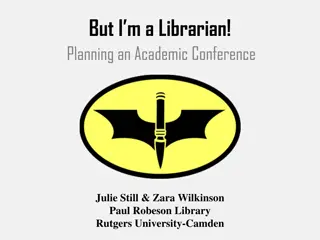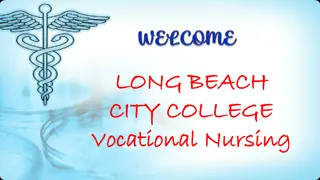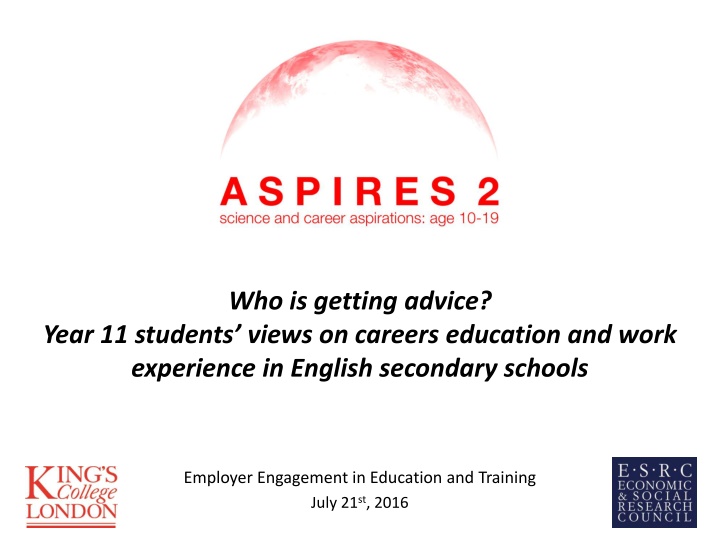
Students' Views on Careers Education and Work Experience in English Secondary Schools
Exploring Year 11 students' perspectives on careers education, work experience, and employer engagement in English secondary schools. The project aims to understand the influences on students' science and career aspirations and their subsequent choices. Research questions focus on the types of advice students receive, satisfaction with current provision, and which student groups are accessing support. The ASPIRES Project conducted surveys and interviews across various phases to gather data for analysis.
Download Presentation

Please find below an Image/Link to download the presentation.
The content on the website is provided AS IS for your information and personal use only. It may not be sold, licensed, or shared on other websites without obtaining consent from the author. If you encounter any issues during the download, it is possible that the publisher has removed the file from their server.
You are allowed to download the files provided on this website for personal or commercial use, subject to the condition that they are used lawfully. All files are the property of their respective owners.
The content on the website is provided AS IS for your information and personal use only. It may not be sold, licensed, or shared on other websites without obtaining consent from the author.
E N D
Presentation Transcript
Who is getting advice? Year 11 students views on careers education and work experience in English secondary schools Employer Engagement in Education and Training July 21st, 2016
Project Team Dr Julie Moote (Research Associate) Prof Louise Archer (Principle Investigator) Prof Becky Francis (Co-Investigator) Dr Jennifer DeWitt (Co-Investigator) Emily MacLeod (Administrator) Lucy Yeomans (Research Student) CONTEXT Methods Results Implications
Project Aims To understand the changing influences of family, peers, school, careers education and social identities and inequalities on students science and career aspirations To relate these to their actual subject choices and attainment on national GCSE examinations and their post-16 choices CONTEXT Methods Results Implications
CONTEXT Methods Results Implications
Rationale Support for the impact and importance of careers education (Harkins, 2001; Hooley et al., 2015; OECD, 2004) Evidence from career professionals and school leaders, but student perspective also needed (CDI, 2015; Gatsby, 2014) Decline in quantity and quality of provision (Achquah et al., 2016; Beck et al., 2006; National Careers Council, 2013) CONTEXT Methods Results Implications
Research Questions What sorts/types of careers information, advice, guidance do students report? Which groups of students are reporting receipt? Are students satisfied with current provision? CONTEXT Methods Results Implications
The ASPIRES Project Phase 1 (age 10/11) Survey of 9,319 Y6 students, 279 primary schools Interviews with 92 children and 78 parents Phase 2 (age 12/13) Survey of 5,634 Y8 students (69 secondary schools) Interviews with 85 children Phase 3 (age 13/14) Survey of 4,600 Y9 students Interviews with 83 students and 65 parents Phase 4 (age 15/16) Survey of 13,421 Y11 students Interviews with 70 students and 62 parents Phase 5 (age 17/19) Survey of Y13 students Interviews with students and parents METHODS Context Results Implications
Overview of Online Student Survey Background information Aspirations Attitudes toward school science Images of scientists Self-concept in science Participation in science-related activities Parental attitudes to science Peer attitudes Subject preferences Careers education and work experience METHODS Context Results Implications
Overview of Survey Data Have you been provided with any information from school or career services relating to the jobs you are interested in? (yes, no, don t know) The careers information I have received at school has been helpful. (strongly agree-strongly disagree) METHODS Context Results Implications
Overview of Interview Data Have you met with a careers advisor yet or had any careers talks/meetings? If so, was it useful? (Why/why not?) (If haven t met with an advisor yet) Do you know when that happens? How could this experience have been improved? METHODS Context Results Implications
Terminology Hutchinson (2013) METHODS Context Results Implications
What types/sorts of CIAG do students report? Range of experiences (from interviews) Mostly one-to-one sessions and career talks Internal and external members of staff Completed online careers questionnaires 60% of interview subjects had one-to-one session 42% mentioned having career talks at school 11% reported timetabled careers lessons Well we have PSHE which is like, they help us about our careers, our future and stuff like that... But it s citizenship and basically stuff like that (Kaka, British Asian boy) Context RESULTS Methods Implications
Who received careers information? Less than two thirds of survey sample reported careers advice Clear demand for more and better careers education Less than half of all students reported work experience Patterned in ways that may be working to promote inequalities relating to gender, ethnicity and social class Context RESULTS Methods Implications
Male Students Careers information reporting by gender 9.1 DON'T KNOW 9.3 25.9 NO 30.4 65 YES 60.3 0 10 20 30 40 50 60 70 Males Females Context RESULTS Methods Implications
White Students Careers information reporting by ethnicity WHITE 63.8 ASIAN 61.1 BLACK 59.7 MIDDLE EASTERN 58.2 CHINESE 56.1 52 54 56 58 60 62 64 66 Context RESULTS Methods Implications
Socially Advantaged Students Careers information reporting by cultural capital VERY HIGH 66.9 MEDIUM 63.4 HIGH 62.2 LOW 61.4 VERY LOW 52.9 0 10 20 30 40 50 60 70 80 Context RESULTS Methods Implications
Triple Science Students Careers information reporting by science option TRIPLE 65.1 DOUBLE 62.2 APPLIED 60.6 OTHER (BTEC) 55.5 50 52 54 56 58 60 62 64 66 Context RESULTS Methods Implications
Top Set or Non Set Students Careers information reporting by science set NO SET 65.9 TOP SET 63.6 MIDDLE SET 61.5 BOTTOM SET 55.9 50 52 54 56 58 60 62 64 66 68 Context RESULTS Methods Implications
Students planning A-Levels and Apprenticeships Careers information reporting by Post-16 plans APPRENTICESHIP 65.1 A-LEVELS 64.4 PART-TIME WORK 58.4 UNSURE 51.9 FULL-TIME WORK 51.8 0 10 20 30 40 50 60 70 Context RESULTS Methods Implications
Overview of Data Have you participated in any work experience relating to the jobs you are interested in? (yes, no, don t know) Have you had any workplace experience? If so, who organised it (school, parents, family friends)? Was it useful? (Why or why not?) METHODS Context Results Implications
Male Students Work experience reporting by gender 3.8 DON'T KNOW 4.5 52.4 NO 49.5 43.8 YES 46 0 10 20 30 40 50 60 Females Males Context RESULTS Methods Implications
White Students Work Experience reporting by ethnicity WHITE 45.7 ASIAN 41.6 BLACK 41.3 MIDDLE EASTERN 38.5 CHINESE 36.1 0 5 10 15 20 25 30 35 40 45 50 Context RESULTS Methods Implications
Double Science/Applied Students Work experience reporting by science option DOUBLE 47.4 APPLIED 45.9 TRIPLE 43.1 OTHER (BTEC) 41.1 37 38 39 40 41 42 43 44 45 46 47 48 Context RESULTS Methods Implications
Apprenticeships and Part-time work Work experience reporting by Post-16 plans APPRENTICESHIP 54.3 PART-TIME WORK 47.9 FULL-TIME WORK 45.7 A-LEVELS 43.3 UNSURE 41 0 10 20 30 40 50 60 Context RESULTS Methods Implications
Regional Differences Work experience reporting by region SOUTH WEST 52.8 LONDON 47.7 EASTERN 47 EAST MIDLANDS 46.5 SOUTH EAST 44.7 WEST MIDLANDS 43.8 NORTH WEST/MERSEYSIDE 40.9 YORKSHIRE & THE HUMBER 40.8 NORTH EAST 32.6 0 10 20 30 40 50 60 Context RESULTS Methods Implications
Differences by Aspiration Careers info reporting by aspiration ENGINEER 68.2 SCIENTIST 67.4 DOCTOR 66.4 TEACHER 66.1 TRADE 63.6 BUSINESS 63.2 LAWYER 62.2 SPORTS 62 DESIGNER 60.4 ARTS 59.1 INVENTOR 58.6 HAIR AND BEAUTY 53.7 0 10 20 30 40 50 60 70 80 Context RESULTS Methods Implications
Differences by Aspiration Work experience reporting by aspiration TRADE 56.2 TEACHER 55.8 BUSINESS 50.3 SPORTS 48.3 ENGINEER 47.8 HAIR AND BEAUTY 47.6 DESIGNER 47.1 INVENTOR 46.7 ARTS 45.4 DOCTOR 45.2 SCIENTIST 42.7 LAWYER 41.6 0 10 20 30 40 50 60 Context RESULTS Methods Implications
Factors contributing to producing these patterns 1. Too little, too late 2. Lack of personalisation/ relevance 3. The self-referral nature of provision 4. Too biased/ partisan 5. Prefer to use other sources of information Context RESULTS Methods Implications
Too Little, Too Late 20% reported support was obligatory Most reported only offered in Year 11 mainly literallyjust been pushed on us this year. Only 4 mentioned they had met with an advisor more than once More than half felt advice was too late Subject choices already made and issues relating to exam pressure and university applications (Louise, White British girl ) Context RESULTS Methods Implications
The Self-Referral Nature of Provision Um, we have a careers advisor, but like to try and find her during break times is so difficult because she s either in that room over there or she s in the [other wing] and then it s like really difficult because they shut. Then you re not allowed anywhere in school apart from the hub during break time or lunchtime, so trying to get through one set of doors to go find her and then finally you re in through, not having her there and having to go back to go a different way and then break time s over and you re just like well that was So I kind of gave up on that one. (Charlie, White British girl) Context RESULTS Methods Implications
The Self-Referral Nature of Provision May contribute particularly to gender trends proportionately more girls reported that the provision was optional and boys were more likely to report having met with an external careers advisor May also help to explain the lower levels of access to careers provision reported among Black students Yeah, or sometimes you just get given it if you don t feel confident with what you re doing in the future. You just tell the teacher and then they ll just book you an appointment. (Gemma, Seychelloise girl) Context RESULTS Methods Implications
Too Biased/Partisan Over half of the students who reported having met with a careers advisor, felt that the support was overly focused on A level choices She could have like talked about what I wanted to be I guess. I mean she just talked about what A Levels I want to do. And then that was it, she just updated my details and that was it. So I think there s going to be like a second part of it hopefully. Desire for impartial advice and guidance (Celina, White British girl) Context RESULTS Methods Implications
Lack of Personalisation/Relevance We ve had a lot of careers talks. People come out of lessons and they have these talks, but I don t think they ve actually helped me at all. I wouldn t expect them to I don t think, because it is quite a specialist thing, so I wouldn t expect them to get someone in just for that, but yeah they are quite concerned about everyone getting careers talks. (Finch, White British boy with Indian/Italian heritage) Context RESULTS Methods Implications
Lack of Personalisation/Relevance If it was like kind of a smaller group, like kind of a one on one meeting. Cos the way we did it was like everyone in the hall, and sat on tables and stuff, and it was just noisy, you couldn t really hear anything. (Gemma, Seychelloise girl) they ve been very vague and not very helpful They just gave us a website and you had to just Google like what job you want to do It s not like oh sit down one to one. Like what do you think you ll do in the future? (Carol, White European girl) Context RESULTS Methods Implications
Lack of Personalisation/Relevance May contribute to gendered patterns proportionately more female students reported that they found meetings with careers advisors and career talks unhelpful In contrast, 81% of boys who reported having met with a careers advisor expressed that they felt the meeting was useful Context RESULTS Methods Implications
Preference For Other Resources Girls and students from South Asian communities more likely to discuss career aspirations and plans with family Um, well in my school we have a careers advisor, so I could go to her. Um, but I could just go to my dad and if he doesn t know he can just ask around. Um, if not I can look on the internet, so the other day I actually looked to see what kind of jobs there are in paediatrics and surgery and what you can specialise in, so (Isabel, Sri Lankan girl) Context RESULTS Methods Implications
Key Messages Careers education is failing to reach those most in need; girls, minority ethnic, working- class, low-attaining students, who plan to leave full-time education or are unsure of their post-16 plans Urgent attention needs to be given to acknowledging and redressing inequalities in terms of who is, and who is not, participating in careers education and work experience Context Methods Results IMPLICATIONS
What might be done? Policy needs to focus on participation , not just provision Dedicated resourcing to target, engage and support disadvantaged groups Address regional differences in work experience and explore ways of providing more work experience in fields such as science and law Take particular care with respect to schemes and opportunities that are offered on an opt in and/or selective basis Context Methods Results IMPLICATIONS
Keeping in touch/ further Info www.kcl.ac.uk/aspires www.kcl.ac.uk/enterprisingscience Follow our research on Twitter: @ASPIRES2science @enterprisingsci Enterprising Science: science capital seminar videos: https://www.youtube.com/playlist?list=PLun2jODy9M2cvE 3bgJ-UCc0dotvrSfRVG ** NEW** ES project Science capital 2 min animation: buff.ly/1KLEbN7

